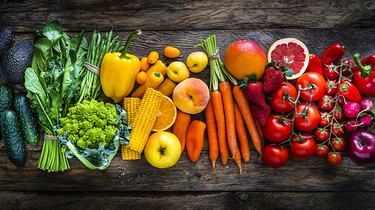
The power of a healthy diet is unmistakable. Steering clear of artery-clogging saturated fats and blood-glucose-raising sugary snacks may help prevent or reverse diabetes and some types of liver disease, including nonalcoholic fatty liver disease (NAFLD) and hepatic steatosis.
Read more: 7 Foods That Won't Cause Blood Sugar Spikes
Video of the Day
Video of the Day
The Diabetes-Liver Disease Connection
Type 2 diabetes and NAFLD travel together. Often called simply "fatty liver," NAFLD is the result of fat accumulation on the liver. Your liver is charged with digesting fats and making and storing glucose or blood sugar for energy. When it's not functioning properly, your liver can set the stage for Type 2 diabetes or worsen high blood glucose levels if you already have diabetes, the American Diabetes Association states.
Unlike other liver diseases, NAFLD is not related to alcohol use. Instead, it's tied to unhealthy eating, a lack of physical activity and having type 2 diabetes, the form of the disease most closely related to obesity, among other factors. NAFLD occurs in at least 50 percent of people with type 2 diabetes, according to the Mayo Clinic. When you have both conditions, poor diabetes control can make your fatty liver disease worse.
What's more, up to 30 percent of people with NAFLD will develop non-alcoholic steatohepatitis (NASH), the more severe form of NAFLD, which is characterized by inflammation and scarring and can lead to life-threatening cirrhosis and liver cancer, according to the National Institute of Diabetes and Digestive and Kidney Diseases.
7 Things You Can Do
Some of the same lifestyle and dietary changes can help improve and possibly even stave off both conditions. Follow these seven tips:
1. Cut back on unhealthy fats. Some fats are more dangerous than others for your liver and your heart, says Audrey Koltun, RDN, CDE, a dietitian in the Division of Pediatric Endocrinology at Cohen Children's Medical Center in Lake Success, New York.
Avoid the saturated fats found in meat, butter and full-fat dairy products and trans fats, listed as hydrogenated or partially hydrogenated oil on food labels of crackers, cookies and cakes. These fats may lead to more fat on your liver and can increase your risk for heart disease. Instead, choose good fats like olive oil and omega-3 fatty acids.
2. Keep your blood sugar level in check. Foods that rank low on the glycemic index (GI), such as fruits, vegetables and whole grains, don't cause dangerous blood sugar spikes the same way high-GI foods like white bread, white rice and potatoes do, the Mayo Clinic notes. The worse the fatty liver, the greater the chance of high blood sugar, adds Koltun.
3. Skip simple sugars. Foods and beverages that contain large amounts of simple sugars, especially fructose, are linked to fatty liver and the insulin resistance that sets the stage for type 2 diabetes, according to the American Liver Foundation.
4. Lose weight if needed. This is essential. If you have overweight or obesity, you are at risk for both diabetes and fatty liver disease. Even losing 1 or 2 pounds a week will help, according to the Cleveland Clinic. Regular exercise can help you keep the weight off, adds the American Liver Foundation.
5. Limit alcohol. Drinking alcohol stresses your already stressed liver, the American Liver Foundation notes.
6. Take care of your heart. Manage all of your heart-related risk factors, including high blood pressure and cholesterol, to stave off heart disease and lower your risk for developing fatty liver disease. Adults with diabetes are two to four times more likely to die from heart disease than their counterparts who don't have diabetes, notes the American Heart Association.
7. Talk to your doctor. Fatty liver doesn't cause any symptoms early on, so if you have diabetes, it's important to ask your doctor how to protect your liver, adds Ajaykumar D. Rao, MD, an associate professor of medicine at the Lewis Katz School of Medicine at Temple University and at the Center for Metabolic Disease Research at Temple University Hospital in Philadelphia.
Your doctor may recommend an ultrasound exam of your liver and regular blood tests to monitor your liver function, states the American Liver Foundation. Getting the hepatitis A and hepatitis B shot may make sense as well. If you get either form of hepatitis and have fatty liver, you're at higher risk for liver failure.
Read more: Foods to Avoid With a Bad Liver
- American Diabetes Association: “The Liver's Role: How It Processes Fats and Carbs”
- Mayo Clinic: “Diabetes: How Do I Help Protect My Liver?”
- Mayo Clinic: “Glycemic Index Diet: What's Behind the Claims?”
- National Institute of Diabetes and Digestive and Kidney Diseases: “Definition and Facts of NAFLD and NASH”
- Audrey Koltun, RDN, CDE, CDN, registered dietitian nutritionist, certified diabetes educator, Division of Pediatric Endocrinology, Cohen Children’s Medical Center, Lake Success, New York
- Cleveland Clinic: “Fatty Liver Disease”
- American Liver Foundation: “What Is Fatty Liver Disease?”
- American Liver Foundation: “What Are the Treatments for NAFLD and NASH?”
- American Heart Association: “Cardiovascular Disease and Diabetes”
- Ajaykumar D. Rao, MD, associate professor, Lewis Katz School of Medicine at Temple University, Center for Metabolic Disease Research at Temple University Hospital, Philadelphia
Is this an emergency? If you are experiencing serious medical symptoms, please see the National Library of Medicine’s list of signs you need emergency medical attention or call 911.